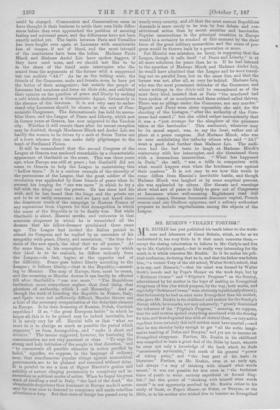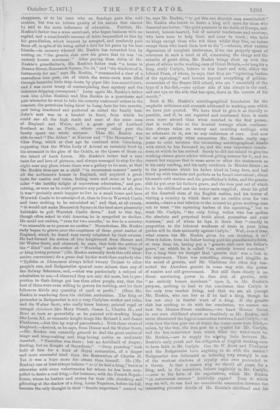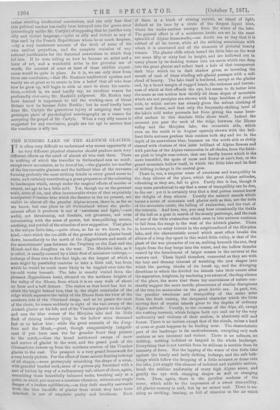MR. BUSKIN'S "VIOLENT TORYISM."
Xi R. RUSKIN has just published his tenth letter to the work- 1.11. men and labourers of Great Britain, which, as far as we understand it, lute very little in it that much concerns them,—. except the closing exhortation to believe in Mr. Carlyle and live up to Mr. Carlyle's gospel,—but is really very interesting for the much in it which concerns Mr. Ruskin. In it he makes his poli- tical confession, declaring that he is, and that his father was before him, "a violent Tory of the old school, Walter Scott's school, that is to say, and Homer's,"—that his mind was formed by Walter Scott's novels and by Pope's Homer on the week days, but by "Robinson Crusoe " and " Pilgrim's Progress" on the Sunday, administered by his mother in the hope of making an Evangelical clergyman of him (for which purpose, by the way, both works, and especially "Robinson Crime," were obviously injudiciouslychosen); that fortunately he had an aunt more Evangelical than his mother, who gave Mr. Ruskin in his childhood cold mutton for the Sunday's dinner, which, he remarks, not very coherently, "greatly diminished the influence of the Pilgrim's Progress,' " meaning, we suppose, that the cold mutton spoiled everything associated with the Sunday for Min, and thus disgusted him with all clerical ideas,—a very active repellent force certainly this cold mutton must have exerted ;—and that he was thereby lucky enough to get "all the noble imagi- native teaching of Defoe and Bunyan," and yet not to become an Evangelical clergyman, Further, Mr. Ruskin in his childhood was compelled to learn it great deal of the Bible by heart, whereto he owes not only a knowledge of the book which he finds "occasionally serviceable," but much of his general "power of taking pains," and "the best part of his taste in literature." Further, as Mr. Ruskin, even at an early age, had always " a way of thinking with himself what words meant," it was not possible for him even in "the foolishest times of youth to write entirely superficial or formal Eng- lish ;" but this power of "thinking with himself what words meant " is not apparently ascribed by Mr. Ruskin either to his study of Scott, or Pope's Homer, or Defoe, or Banyan, or the
clergyman, or to his aunt who on Sundays gave him cold mutton, but was an inborn quality of his nature that cannot
be laid to the mere influences of education. Further, Mr. Ruskin's father was a wine merchant, who began business with no capital, and a considerable amount of debts bequeathed to him by his grandfather, which bequest he accepted, and resolutely paid them off, in spite of his being called a fool for his pains by his best .friends,—iu memory whereof Mr. Raskiu has rewarded him by writing on "the granite slab over his grave that he was 'an entirely honest merchant.'" After paying these debts of Mr. Ruskin's grandfather's, Mr. Ruskin's father took "a house in Hunter Street, Brunswick Square, No. 54," and "the windows of it, fortunately for me," says Mr. Ruskin, "commanded a view of a marvellous iron post, out of which the water-carts were filled through beautiful little trap .doors, by pipes like boa-constrictors, and I was never weary of contemplating that mystery and the delicious dripping consequent." Later again Mr. Ruskin's father took him (John Ruskin) and Mrs. Ruskin in a postchaise and pair whenever he went to take his country customers' orders in the summer, the postchaise being hired in Long Acre for two months, and being bracketed and pocketed as suited the family best. John's seat was on a bracket in front, from which he could see all the high roads and most of the cross ones of England and Wales, and a great part of Lowland Scotland as far as Perth, where every other year the family spent the whole summer. Thus Mr. Ruskin was able to read "The Abbot" at Kinross and "The Monastery" in Glen Farg, which at that age he confused with Gleudearg, supposing that the White Lady of Avenel as certainly lived by the streamlet in the glen of the Ochils, as the Queen of Soots on the island of Loch Leven. Mr. Ruskin's father had a rare taste for and love of pictures, and always managed to atop for the night near any place where there waki a gallery to be seen, so that Mr. Ruskin thus saw as a child "in reverentest manner" nearly all the noblemen's houses in England, and acquired a great taste for castles and ruins, feeling more and more as he grew older "the healthy delight of uncovetous admiration," and per- ceiving, as soon as he could perceive any political truth at all, that it was" probably much happier to live in a small house and have Warwick Castle to be astoniehed at, than to live in Warwick Castle and have nothing to be astonished at," and that, at all events, "it would not make Brunswick Square in the least more pleasantly habitable to pull Warwick Castle down." And to this day, though often asked to visit America, he is compelled to decline. He could not endure, "oven for two mouths," to live in a country "so miserable as to possass no castles." Nevertheless, Mr. Ruskin early began to grieve over the emptiness of these great castles of England, which he found very rarely inhabited by their owners. He had formed his notion of true knighthood from Homer and Sir Walter Scott, and observed, he says, that both the author of the " Iliad" and the author of " Waverley " made their "kings or king-loving persons" (Mr. Ruskin naturally finds this odd alter- native convenient) do a great deal harder work than anybody else. "Tydides or Idomeneus always killed twenty Trojans to other people's one, and Redgauntlet speared more salmon than any of the Solway fishermen, and,—what was particularly a subject of admiration to observed they not only did more, but in pro- portion to their doings got less than other people, nay, that the best of them were even willing to govern for nothing, and let their followers divide any quantity of spoil or profit." (Here Mr. Ruskin is wandering from his childish authorities. The king or pretender in Redgauntlet is not a very Carlyleso worker and ruler, and Sir Walter Scott, who really knew history, painted regal or unregal faineants like Mary Stuart, James I., Charles II., and .Rend at least as powerfully as he painted evil-working kings like Louis XI, or romantic knight-kings like Richard I. and James FitzJames,—but this by. way of parenthesis.) With these views of kinghood,—derived, as lie says, from Homer and Sir Walter Scott, —Mr. Ruskin was naturally grieved to find the great castles of kings and king-making and king-loving nobles so uniformly deserted. " Tantallon was there ; but no Archibald of Angus ; Stirling, but no Knight of Snowdouu." "Deep yearning" took hold of him for a kind of Royal restoration, of a deeper and more successful kind than the Restoration of Charles II. Yet it was a hope more for others than himself. He (Mr. Ruskin) can at least always behave "a. if he had a king," but it is otherwise with some unfortunates for whom he has been com- pelled to desire a real king,—for instance, with the French Repub- licans, whom he loathes and scorns for their idle shrieking and gibbering at the shadow of a king, Louis Napoleon, before his fall, because the only thought in their "frantic impotence" seemed to
be, says Mr. Ruskin, " to get this one shortish num assassinated." Mr. Ruskin also learnt to desire a king still more for those who deserved one better, " the quiet peasauts in the fields of Europe, sad- browed, honest-hearted, full of natural tenderness and courtesy, who have none to help them and none to teach ; who have no kings except those who rob them whilst they live, no tutors except those who teach them how to die ";—whence, after various digressions of complete irrelevance, if we can properly speak of relevance in such a tract at all, concerning the clergy and the suburbs of great cities, Mr. Ruskin brings short up with this piece of advice to the working-mon of Great Britain,—to long for a king, study Carlyle, believe in him heart and soul, abhor the Liberal Press, of whom, he says, that they are "squinting leaders of the squinting," and beware beyond everything of politico- economists of the Stuart-Mill school, who arc " essentially of the type of a fiat-fish,—one eyeless side of him always in the mud, and one eye on the side that has eyes, down in the corners of his mouth."
Such is Mr. Ruskin's autobiographical foundation for the emphatic criticisms and counsels addressed to working-men which we have just quoted. We have tried • to give it as literally as possible, and if, in our reported and condensed form it reads even more absurd than when couched in the first person, that is really due to the ironical revenge which condensa- tion always takes on watery and rambling verbiage with no substance in it, not to any unfairness of ours. And now let us ask gravely what connection Mr. Ruskin really sup- poses to exist between the interesting autobiographical details with which he has favoured us, and the very important conclu- sions at which he has arrived. Surely he did not intend to give the working-classes grave advice without giving reasons for it, and we cannot but suppose that in some sense or other the statements as to his early reading, and his early residence in Hunter Street ; as to the postchaise which his father hired in Long Aare, and had fitted up with brackets and pockets as he found convenient ; about his aunt's cold mutton and his grandfather's debts, and the granite slab he put over his father's grave, and the iron post out of which he in his childhood saw the water-carts supplied ; about his grief at the deserted state of the English castles, and his horror of visiting a country in which there are no castles oven for two months,—have a real relation to the counsel he gives working-men not to trust "the squinting leaders of the squinting," but to trust Mr. Carlyle, "the only living writer who has spoken the absolute and perpetual truth about yourselves and your business," and of whom he lays it down that "exactly in proportion to the inherent weakness of brain in your lying guides will be their animosity against Carlyle." Well, oven if true, what reason has Mr. Ruskin given for our thinking it so ?. Does it follow, from his father having paid his grandfather's debts, or oven from his having put a "granite slab over his father's grave," on which he is called "an entirely honest merchant." For a long time we thought that granite slab' was a link in the argument. There was something strong and kinglike in the sound of granite, and Mr. Gladstone the other day con- nected the Aberdeen granite in some way with the power
of resolve and self-government. But still there clearly is no direct convincing power in that slab of granite, with " an entirely honest merchant" upon it, to Mr. Ruskin's purpose, nothing to lead to the conclusion that Carlyle is the only true teacher living, and that we are all (except Mr. Ruskin, who can live as if he had a king, though lie: has not one) in fearful want of a king. If the granite slab has nothing to do with the conclusion, we cannot see how the Hunter-Street residence,—we knew Hunter Street in our own childhood almost as familiarly as Mr. Ruskin, and never discovered the logical connection between it and Carlyle,—or even how the iron post out of which the water-carts were filled,— unless, by the way, the iron post be a symbol for Mr. Carlyle, and the boa-constrictor hose which filled the water-carts for Mr. Ruskin,—are to supply the 4sing links betweeu Mr. Ruskin's early youth and the obligation of English workiug-inen to have faith in Mr. Carlyle. Can Sir W. Scott and IfitzJarnes and the Redgauntlet have anything to do with the matter ? Redgauntlet was delineated as believing very strongly in one of the weakest shadows of royalty who ever pretended to a throne. Is that a reason why we should all yearn for a king, and, in the meantime, believe implicitly in Mr. Oarlyle, —even to the form, of his superlatives, which Mr. Ruskin "iii reverentest manner" faithfully copies? Turn it which way we will, we can find no conceivable connection between the interesting pictorial details of Mr. Ruskin's childhood and his rather startling intellectual conclusions, and can only fear that this political teacher has really been betrayed into the grave error (exceedingly unlike Mr. Carlyle) of supposing that he justifies very silly and violent language,—quite as silly and violent as any of that used by the French Republicans whom he so much despises, —by a very incoherent account of the birth of some of his own earliest prejudices, and the complete omission of any rational justification for the distorted convictions to which they led him. If he were telling us bow he became an artist and a lover of art, and a wonderful artist in the pictorial use of words, the account of some at least of these childish experi- ences would be quite in place. As it is, we can only draw from them one conclusion,—that Mr. Ruskin's intellectual egotism and vanity are so great as to create in him a belief that all who hear how he grew up, will begin to wish at once to share his convic- tions,—which is, we need hardly say, an excellent reason for profoundly distrusting Mr. Ruskin's judgment. Mr. Ruskin may have deemed it important to tell the working-men of Great Britain how he became Joins Ruskin ; but he need hardly have done Mr. Carlyle the gratuitous injury of assigning that very grotesque piece of psychological autobiography as a reason for accepting the gospel of Mr. Carlyle. When a very silly reason is suggested for any conclusion, people are too apt to assume that the conclusion is silly too.




































 Previous page
Previous page